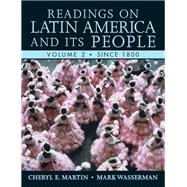
Note: Supplemental materials are not guaranteed with Rental or Used book purchases.
Purchase Benefits
What is included with this book?
Cheryl E. Martin has taught Latin American History at the University of Texas at El Paso since 1978. A native of Buffalo, New York, she received her bachelor’s degree from the Georgetown University School of Foreign Service and her M.A. and Ph.D. from Tulane University. She studied at the Universidad de Cuenca, Ecuador, on a Fulbright Fellowship and was a visiting instructor at the Universidad Autónoma de Chihuahua, Mexico. Her publications include Rural Society in Colonial Morelos (1985) and Governance and Society in Colonial Mexico: Chihuahua in the Eighteenth Century (1996). She also co-edited, with William Beezley and William E. French, Rituals of Rule, Rituals of Resistance: Public Celebrations and Popular Culture in Mexico (1994). Professor Martin has served on the council of the American Historical Association and on the editorial boards of the Hispanic American Historical Review, The Americas, the Latin American Research Review, and H. Borderlands. She has received two fellowships from the National Endowment for the Humanities and Awards for Distinguished Achievement in both teaching and research at the University of Texas at El Paso. In her spare time, she likes to ice skate.
Mark Wasserman is a professor of history at Rutgers, The State University of New Jersey, where he has taught since 1978. Brought up in Marblehead, Massachusetts, he earned his B.A. at Duke University and his M.A. and Ph.D. at the University of Chicago. He is the author of three books on Mexico: Capitalists, Caciques, and Revolution: The Native Elite and Foreign Enterprise in Chihuahua, Mexico, 1854—1911(1984); Persistent Oligarchs: Elites and Politics in Chihuahua, Mexico, 1910—1940 (1993); and Everyday Life and Politics in Nineteenth Century Mexico: Men, Women, and War (2000). He also coauthored the early editions of the best-selling History of Latin America (1980—88) with Benjamin Keen. Professor Wasserman has twice won the Arthur P. Whitaker Prize for his books. Professor Wasserman has received research fellowships from the Tinker Foundation, the American Council of Learned Societies/Social Science Research Council, the American Philosophical Society, and the National Endowment of the Humanities. He has been Vice-Chair for Undergraduate Education of the Rutgers Department of History and Chair of the Department’s Teaching Effectiveness Committee. Professor Wasserman was an elected member of the Highland Park, New Jersey, Board of Education for nearly a decade and served as its president for two years. He is an avid fan of Duke basketball and enjoys hiking and travel.
1. Independence in Mexico
2. Popular Participation in Nineteenth Century Politics
3. War
4. Everyday Life in the Countryside: Nineteenth Century
5. Everyday Life: Slaves
6. Everyday Life: Cities in the Nineteenth Century
7. The Military
8. Everyday Life in the Countryside: Twentieth Century
9. Everyday Life: Cities in the Twentieth Century
10. Mexican Revolution
11. Time of the Terror and Civil Wars
12. The New Latin America
The New copy of this book will include any supplemental materials advertised. Please check the title of the book to determine if it should include any access cards, study guides, lab manuals, CDs, etc.
The Used, Rental and eBook copies of this book are not guaranteed to include any supplemental materials. Typically, only the book itself is included. This is true even if the title states it includes any access cards, study guides, lab manuals, CDs, etc.